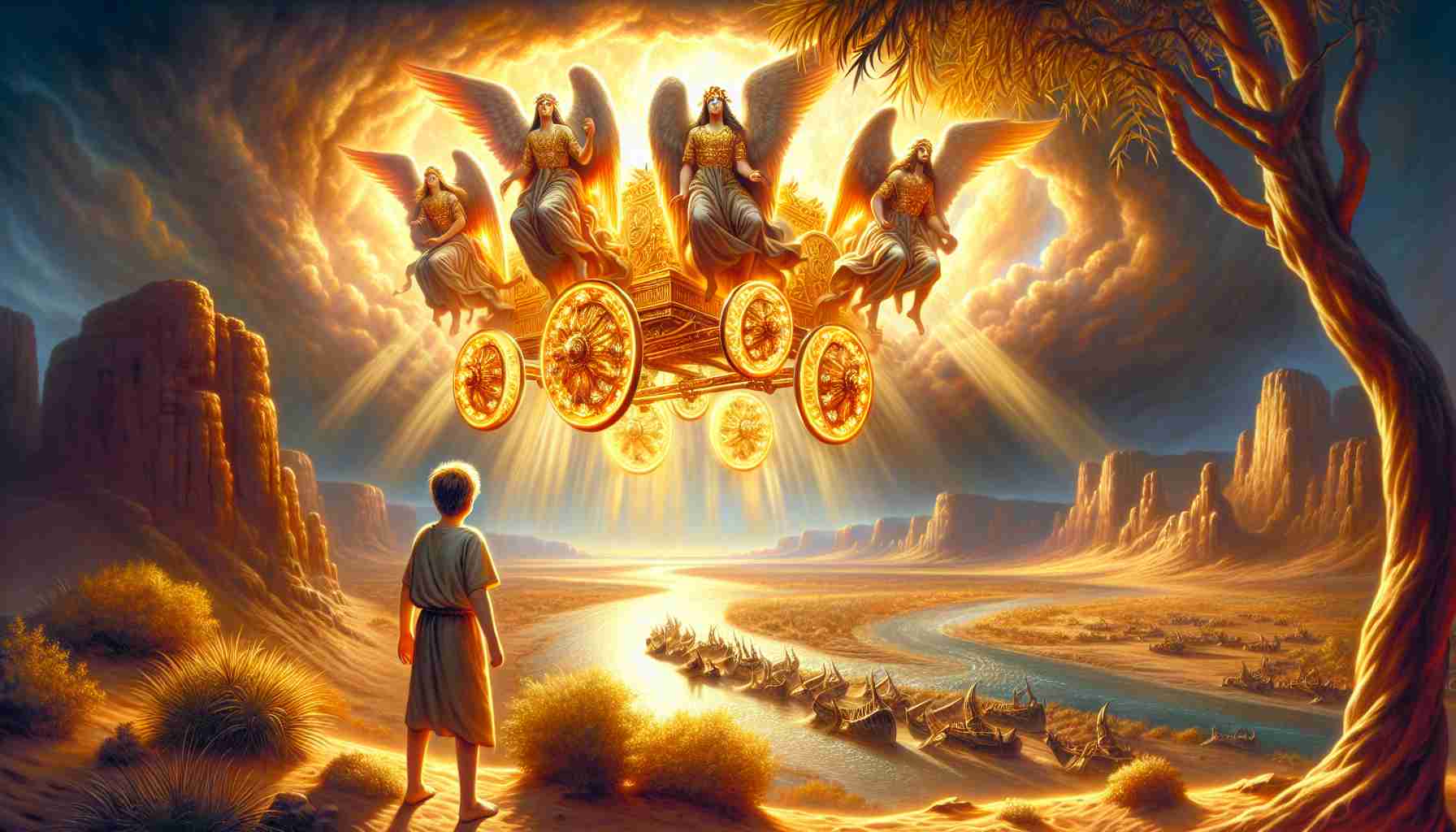

I was the scribe’s apprentice in the camp by the Chebar River. My hands were still stained with ink the day the skies tore open.
That morning had been quiet. Babylon, where we were exiled, felt heavy as always—heavy with the weight of homes lost, with dreams left behind in Jerusalem. Ezekiel, the prophet among us, had gone to be alone again. He often did that. I used to wonder what a man could say to God after everything we had endured—the destruction of the Temple, the fall of our holy city, and the long walk into exile under the cruel hand of Nebuchadnezzar, the mighty king of Babylon.
I saw him first at midmorning, Ezekiel standing stiff as a pillar on the banks, eyes wide as though fire had entered his chest. At first, I thought he was sick. But then I followed his gaze—and I saw it.
There are no words that can truly tell you what I saw, but I will try.
Four figures—beings of light—stood within a storm of cloud and fire, each with four wings and four faces. They moved in perfect sync, and beside them were wheels—not ordinary wheels, but spinning ones, a wheel within a wheel, shining like polished beryl. The wheels turned without turning. It made my heart race.
Above them, like a throne of sapphire, was a manlike figure glowing like metal from a forge. A rainbow encircled Him. And I knew… this was the presence of God. Even in exile—far from Jerusalem, far from the ruined Temple—His glory had come to us.
I fell to the ground, my face in the dust. For a moment, I forgot my sorrow. I forgot my people’s humiliation and the silence that filled our nights. There was only God—still watching, still ruling, even in the land of our enemies.
Later that night, Ezekiel shared the vision. He told us that God had not abandoned us, even though we had been taken from the land. His chariot, the Merkavah, moved not just in Jerusalem—but into exile. Into Babylon. Into broken hearts like mine.
I had thought holiness belonged only to our past, to stones shattered and walls burned. But that day by the river, I learned that God’s presence cannot be chained to one place. His glory rides on chariots of fire, reaching even the furthest corners where His people weep.
I write more carefully now. Each letter I press into parchment carries a new hope. If the skies could open here, then there is no place so dark that God cannot enter it.
Even Babylon. Even a heart like mine.
I was the scribe’s apprentice in the camp by the Chebar River. My hands were still stained with ink the day the skies tore open.
That morning had been quiet. Babylon, where we were exiled, felt heavy as always—heavy with the weight of homes lost, with dreams left behind in Jerusalem. Ezekiel, the prophet among us, had gone to be alone again. He often did that. I used to wonder what a man could say to God after everything we had endured—the destruction of the Temple, the fall of our holy city, and the long walk into exile under the cruel hand of Nebuchadnezzar, the mighty king of Babylon.
I saw him first at midmorning, Ezekiel standing stiff as a pillar on the banks, eyes wide as though fire had entered his chest. At first, I thought he was sick. But then I followed his gaze—and I saw it.
There are no words that can truly tell you what I saw, but I will try.
Four figures—beings of light—stood within a storm of cloud and fire, each with four wings and four faces. They moved in perfect sync, and beside them were wheels—not ordinary wheels, but spinning ones, a wheel within a wheel, shining like polished beryl. The wheels turned without turning. It made my heart race.
Above them, like a throne of sapphire, was a manlike figure glowing like metal from a forge. A rainbow encircled Him. And I knew… this was the presence of God. Even in exile—far from Jerusalem, far from the ruined Temple—His glory had come to us.
I fell to the ground, my face in the dust. For a moment, I forgot my sorrow. I forgot my people’s humiliation and the silence that filled our nights. There was only God—still watching, still ruling, even in the land of our enemies.
Later that night, Ezekiel shared the vision. He told us that God had not abandoned us, even though we had been taken from the land. His chariot, the Merkavah, moved not just in Jerusalem—but into exile. Into Babylon. Into broken hearts like mine.
I had thought holiness belonged only to our past, to stones shattered and walls burned. But that day by the river, I learned that God’s presence cannot be chained to one place. His glory rides on chariots of fire, reaching even the furthest corners where His people weep.
I write more carefully now. Each letter I press into parchment carries a new hope. If the skies could open here, then there is no place so dark that God cannot enter it.
Even Babylon. Even a heart like mine.